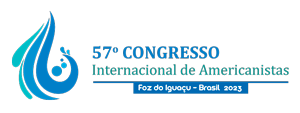| Dados do autor | |
|---|---|
| Nome | Anthony Baxter Jr |
| E-mail do autor | Email escondido; Javascript é necessário. |
| Sua instituição | Center for Latin American Studies, University of Florida |
| Sua titulação | Mestrando |
| País de origem do autor | Estados Unidos |
| Dados co-autor(es) [Máximo de 2 co-autores] | |
| Proposta de Paper | |
| Área Temática | 15. Filosofia e Pensamento |
| Grupo Temático | Towards a Southern Afro-Brazilian and Afro-Latin American Epistemology: a necessary debate on Critical Theory |
| Título | Recentering Haitian Vodou as a System of Ancestral Knowledge and Wisdom That Informs Africana Resistance and Decolonization. |
| Resumo | In 1791, Cecile Fatima and Boukman Dutty led the elusive Vodou ceremony at Bwa Kayiman that would conjure the warrior Lwa, Ogou amongst the enslaved population and mark the beginning of the Haitian revolution. More than two centuries later, Vodou continues to face the same scrutiny and demonization by western countries that it faced as it once reverberated fear throughout the hearts of colonizers as they watched their plantations, property and ambitions go up in flames and smoke. Intentionally, there is constant propaganda spread about the religion that focuses on baneful dolls with pins, zombies, and the possession of souls for the sake of evil in novels, films, art, government reports and other spaces of influence. This paper argues that the narratives circulated about Vodou are for the benefit of maintaining the coloniality of power and suppressing the resistance of Africans against the erroneous systems that are actively at work to oppress them. Accordingly, I will engage in recentering Vodou as an indigenous, alternative modality of living left by our African ancestors that not only illuminates the path to a connection with the creator, but a blueprint of resistance and decolonization of the mind, body, and spirit which inevitably disrupts the coloniality of power. More specifically, I will explore how Vodou has helped Africana people heal from the abhorrent scars of colonialism and how it impacts resistance movements among the rural and urban populations of Haiti. |
| Palavras-chave | |
| Palavras-chave |
|
